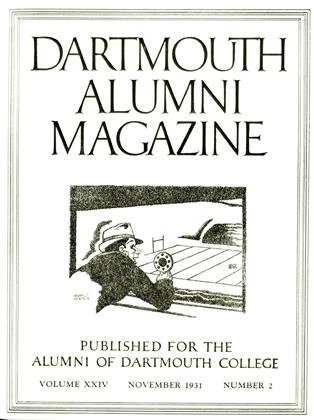WHAT ARE THE FACTS?
IN the October issue of Scribner's Magazine W. H. Hale proves at least to his own satisfaction that a college education is a fraud, a four-year vacation from which one derives nothing. With a series of neat phrases and careful irony he blasts a B.A. degree as far as his considerable powers allow. At a quick and superficial reading his article sounds convincing enough. On reflection, however, one is forced to conclude that he has beaten an unusually fast ride out of a very jaded horse no more.
For the same censure was levelled against the college thirty years ago and will no doubt be relevelled in thirty more years. We grant that mass production has been and still is the dominant factor in the routine of procuring a college degree. Up to the present the college, like big business, has operated for the most part under the principle of expansion.
And, of course, in such a system the individual is necessarily slighted.
Nevertheless, it is barely possible that a true individual neither needs nor profits by coddling and favors, that in college he breaks easily the swaddling bands of a curriculum, and by superior endowments creates spare time during which he may follow whatever particular inclination he has. In other words, Mr. Hale's "mythical monster, the average student," who constitutes the majority of any college, needs far more to be led by the hand than his more endowed brother.
I know nothing about Yale except that only by a miracle, apparently, shall we ever succeed in winning a football game from her. It is therefore possible that Mr. Hale's attack on his Alma Mater is justified. Not justifiable, on the other hand, is his implied damning of Dartmouth on the same grounds of mass education, inferior instruction, and the like, as he does his own school.
In recent years we have established the Honors System, whereby a man spends the last two years of college working with a classmate under a tutor, and is given the maximum amount of freedom compatible with the definite accretion of culture. Certainly this is a step toward the recognition of the individual. There has also been created a committee on curricular adjustments which is empowered to change the requirements for a degree in the case of any deserving applicant. Finally, each year several Senior Fellows are chosen on whom are placed no requirements save that of residing in Hanover.
In addition to the above innovations, there is an increasing liberality of college regulations as a whole special evening classes, seminars, and carefully outlined majors all of which though planned in general for the masses benefit also the exceptional student. And as a last step, the dull, absent-minded professor, ludicrous in his shortcomings, capable of inspiring only laughter among his students, and peering out ostentatiously from behind a Ph.D. is practically extinct.
Yet Mr. Hale bemoans the fact that his place has been taken by what he terms "beardless junior instructors." This point we find difficult to grasp for not only have some of our young instructors beards, or at least moustaches, but are also able to combine a sound, schollastic experience from the outside world. Thus they bring two viewpoints to the student and are willing, because of their own youth, to alleviate the necessarily barren stretches which are found in any pursuit of knowledge.
In conclusion, then, I believe that Mr. Hale has thrown most of his stones merely for the pleasure of hearing glass break, especially when by an extraordinary piece of literary gymnastics he indicts the college for its lack of democratic leaders.
No one is probably optimistic enough to hail the college as a perfect institution. Nor is the college itself so blind as to deny its defects. But the fact* that it is steadily, even slowly, eliminating these is a matter for optimism rather than a long and artificial wail over a fancied waste of four years.
The caustic article in a recent numberof SCRIBNER'S titled "Over My Shoulder to Alma Mater, An Undelivered Valedictory" was composed by William Harlan Hale, erstwhile editor of the HARKNESSHOOT, immediately subsequent to his receiving the bachelor's degree from Yale.Hardly had the academic costume beenthrown aside before his facile pen producedthe damning accusation levelled against thecollege of liberal arts, perhaps against hisown college in particular. That peculiarinstitution, the American college, is olderthan the nation itself and gives every promise of perpetuating itself for centuries tocome. It may need no defense in the face ofbitter attacks. But it does not hesitate toreply and explain. H. S. Buxbaum isDartmouth's spokesman. He is a Dartmouth graduate of last June and is doingadvanced work in English on a specialfellowship.
 View Full Issue
View Full Issue
More From This Issue
-
 Article
ArticleThe Class of Nineteen Thirty-five
November 1931 By E. Gordon Bill -
 Sports
SportsFootball at Dartmouth in the Year 1931
November 1931 By Sidney C. Hayward -
 Class Notes
Class NotesCLASS of 1910
November 1931 By "Hap' Hinman -
 Class Notes
Class NotesCLASS of 1930
November 1931 By Albert I. Dickerson -
 Class Notes
Class NotesCLASS of 1926
November 1931 By J. Branton Wallace -
 Class Notes
Class NotesCLASS of 1929
November 1931 By Frederick William Andres







